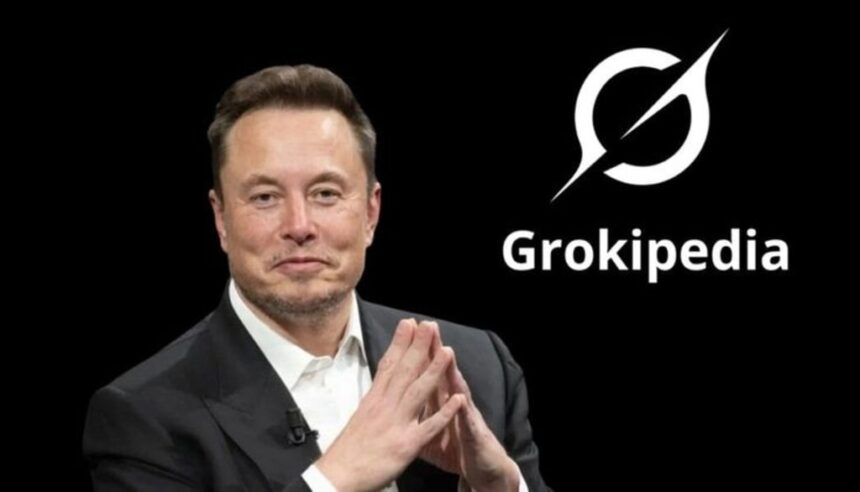Elon Musk has unveiled Grokipedia, a new open-source online encyclopedia developed by his artificial intelligence company, xAI, describing it as both a rival to Wikipedia and a long-term mission to safeguard human knowledge for future generations, on Earth, in space, and beyond.
“Nice work by the @xAI team on Grokipedia.com! The goal here is to create an open source, comprehensive collection of all knowledge,” Musk wrote on X (formerly Twitter), announcing the launch of what he calls the “foundation” of a universal information archive.
He added that copies of the database would eventually be “etched in a stable oxide in orbit, the Moon, and Mars to preserve it for the future.”
A new kind of encyclopedia
Grokipedia is the latest in a growing list of projects by xAI aimed at reshaping how people interact with information.
Unlike Wikipedia, which relies on community editors and donations, Grokipedia operates as a fully open-source, AI-assisted repository designed to integrate seamlessly with Musk’s conversational AI, Grok, already available on the X platform.
According to xAI’s announcement, Grokipedia version 0.1 is now live and open to all users “at no cost.” The platform is built to allow anyone to edit, verify, and expand articles, with transparent change logs to trace every modification, a move intended to foster accountability and limit misinformation.
Musk has said the overarching goal is “the truth, the whole truth, and nothing but the truth,” emphasizing that the encyclopedia’s open architecture and AI integration will enable faster fact-checking and cross-referencing between sources.
Taking aim at Wikipedia
The launch of Grokipedia also reignites Musk’s long-running criticism of Wikipedia, a platform he has repeatedly accused of political and ideological bias.
Over the past year, Musk has publicly clashed with Wikipedia’s administrators, claiming the platform’s editorial model encourages groupthink rather than independent reasoning.
In several X posts preceding the launch, Musk urged users to “stop donating to Wikipedia” until “balance is restored,” arguing that the site’s moderation policies have eroded its neutrality.
The launch, initially expected on October 20, was postponed “to purge out propaganda,” Musk said, an apparent jab at Wikipedia’s editorial framework.
His comments underscore a broader ambition which is to position Grokipedia as both a technological and philosophical alternative to what he perceives as the centralized gatekeeping of online information.
Beyond Earth: Preserving knowledge for the future
Perhaps the most ambitious element of Musk’s announcement is the plan to store copies of Grokipedia’s knowledge archive beyond Earth’s atmosphere.
By engraving data into durable oxide materials and placing them in orbit, on the Moon, and eventually on Mars, Musk envisions what can be described as a “cosmic backup of human civilization.”
This idea aligns with other preservation efforts such as the Lunar Library and Arch Mission Foundation, which have previously stored human texts and scientific data on extraterrestrial surfaces.
However, Musk’s proposal stands out for merging digital preservation with AI-driven knowledge curation, a combination that could turn Grokipedia into what analysts call a “living archive,” continually updated by both humans and machines.
Technology experts believe Musk’s aim is not just to store facts, but to ensure humanity’s collective memory can survive global catastrophes, whether environmental, nuclear, or technological.
Musk’s ambition extends far beyond innovation; it gestures toward a vision of resilience for an interplanetary civilization.
A challenge to the established order of information
Grokipedia’s arrival marks a direct challenge to the dominance of Wikipedia, which for more than two decades has shaped how billions of people access knowledge online.
If successful, Musk’s new platform could redefine digital authorship by combining the openness of crowdsourced data with the verification power of artificial intelligence.
However, critics caution that Grokipedia could face the same challenges that have plagued similar initiatives, from misinformation and data vandalism to concerns over AI-driven editorial control.
Some observers have also noted that Musk’s influence over both the platform and the social network X might raise questions about editorial independence.
For now, Musk insists that Grokipedia is not just another tech venture but a foundational project for humanity’s intellectual continuity.
As he put it in his final post announcing the launch: “Foundation.” The single word captures both the scale and permanence of his ambition, to build a knowledge system not only for this generation but for those yet to come.
Talking Points
Elon Musk’s launch of Grokipedia represents a fascinating yet controversial intervention in the digital knowledge ecosystem.
While the idea of a transparent, open-source encyclopedia backed by artificial intelligence, and even preserved beyond Earth, is undeniably visionary, it also raises important questions about control, neutrality, and credibility.
Musk’s criticism of Wikipedia’s ideological bias may resonate with those frustrated by mainstream moderation, but positioning himself as the arbiter of “truth” carries its own risks, especially given his polarizing public persona and history of using X to amplify contested narratives.
If Grokipedia truly succeeds in combining AI verification with community-driven editing, it could redefine how information is created and preserved; yet without independent oversight and safeguards against bias, technological or ideological, it risks becoming another echo chamber, mirroring the very flaws it was built to correct.
________________________
Bookmark Techparley.com for the most insightful technology news from the African continent.
Follow us on X/Twitter @Techparleynews, on Facebook at Techparley Africa, on LinkedIn at Techparley Africa, or on Instagram at Techparleynews






